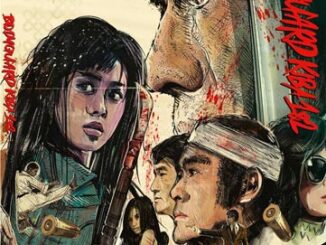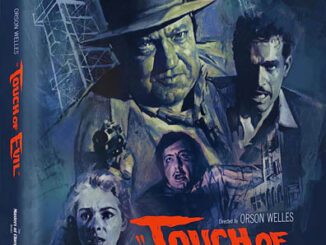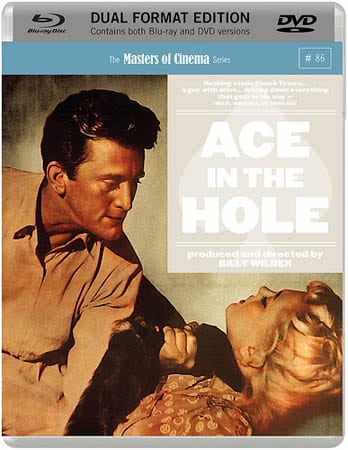The Sons of Great Bear (1966)
Directed by: Josef Mach
Written by: Liselotte Welskopf-Henrich
Starring: Gojko Mitic, Hans Hardt-Hardtloff, Jirí Vrstála, Rolf Römer
EAST GERMANY
AKA DIE SOHNE DER GROBEN BARIN
AVAILABLE ON BLU-RAY: 21st May, from EUREKA ENTERTAINMENT
RUNNING TIME: 92 mins
REVIEWED BY: Dr Lenera

It’s 1974, and the U.S. government has made a deal with the Lakota people that no more of the their land will be taken. However, when Chief Mattotaupa gambles with white crook Red Fox, Red Fox murders him when he sees that he has gold, an act seen by his son Tokei-ihto. Two years later, Native Americans and Whites are at war again, because the likes of General Crook are after that gold that seems to exist in the Black Hills and are trying to force the Lakota into “reservations” where the land isn’t always fertile. Tokei-ihto visits the nearest fort and asks for peace, but barely escapes back to his village with his life. Red Fox soon shows up, demanding that Tokei-ihto offer up himself as prisoner or there will be a lot more bloodshed….

A German Western. The idea might sound odd until one thinks of Italian westerns, and that a considerable number of Italian westerns were actually co-productions with studios in other countries, especially Spain, France and – probably most of all – West Germany. Of course communist-ruled Eastern Germany wasn’t going to tolerate such decadent stuff, but did produce a series of Westerns which were firmly pro-Native American, and when this site’s Webmistress Bat told me that Eureka Entertainment, who have already brought out some other films from the DEFRA studio, were releasing the first of these and had been sent a copy, I was most interested. After all, I’ve been a great lover of pro-Native American Westerns for much of my life, ever since I read Dee Brown’s “Bury My Heart At Wounded Knee” at quite a young age which told how the west was really won. Westerns were often shown on UK TV back then, but I was the oddball who’d cheer the “Red Indians” as they attacked attacked wag0n trains and cavalry, and absolutely adored such films as Apache and A Man Called Horse, way way before Dances With Wolves came along. The Sons Of Great Bear is not in the same league as those films. One can’t really criticise having all its Native Americans being played by Germans when, for example, Little Big Man had them all except one played by oriental performers, and even the Socialist propaganda has to be accepted as a necessity and isn’t as full-on as you might expect, but the film is a bit stiff and stilted, and with sometimes awkward storytelling that seems to have gaps in it. Nonetheless it’s still a fascinating watch, is admirable how high it aims, looks great with fabulous cinematography of the Czech plains ably doubling for the West, and the extremely athletic Gojko Mitic is Charisma Central as the lead.
We open with a great shot of our hero standing by his horse with his back to us in the foreground,, a saloon to his left and mountains to his right in the background. Tokei-ihto ties his animal to a tree and enters warily holding his rifle, where a group of white men are gambling at one table and his father Chief Mattotaupa is sat at another table on his own. The barmaid Jenny, who’s then told off by the owner for keeping a couple of coins for herself, pours him some “firewater” but he tips it onto the ground, a gesture he does again later. Mattotaupa is actually waiting for his friend Red Fox aka Jim Fred Clark, who then turns up, but Red Fox proves himself to be not much of a friend at all. He drags Mattotaupa to the gambling table, where the Chief, after being asked to bet with his house or his horse because he doesn’t use money, presents a piece of gold as his currency. Red Fox demands that Mattotaupa reveal the location of where the gold came from, and when refused, pulls out a knife, kills him and scalps him, in the first of several brutal events handled with considerable restraint, though it’s curious that we don’t see Tokei-ihto act really devastated about this. Were even displays of intense emotion forbidden by the East German censors – or rather the government – at the time? Some time later, the Whites want to kick several tribss out of the land that they promised them that they could stay, something supposedly bound by contract, largely because they want this gold. The Dakota are among them, desperately fighting back, and they might join up with Tashunkao-witko [better known of course as the real-life Crazy Horse] against the also real-life General Crook.
Tokei-ihto and bis group the Bear Band raid a wagon train and it’s the film’s first action scene. While it clearly bares the influence of the similar scene from Stagecoach, right down to some virtually identical shots, what’s odd about it is not so much its tameness, but that nobody seems to get killed. Instead, the Native Americans spare everyone and return to the fort, including the commander Sam Smith’s daughter Katie. Major Smith orders one of his Native American scouts to be tied to a post and whipped 25 times, then turns down Tokei-ihto’s offer of peace and threatens to kill him there and then, though then curiously stops one of his officers from killing him by shooting him in his gun hand. Tokei-ihto then escapes and single-handedly destroys their munitions depot, then returns to his village, though then Red Fox appears, offering a peace treaty which involves the group having to move to poor land. He’s accompanied buy Tobias the Delaware chief, and one of the saddest scenes is when Tobias is asked why he’s aiding the Whites and explains that he has nothing left. It hits so hard because this film, despite its wholely admirable stance, holds back from showing any of the appalling massacres that the Cavalry carried out during the events depicted. This reticence was probably because of very tight censorship, though, just before Tokei-ihto has to go back to the Fort for this treaty, tears it up and is then imprisoned, and just after we see Red Fox and another man ordering children to be taken from parents to be “educated”, we see Red Fox and another guy shoot two Native Americans which includers a teenage boy. The Bear Band are then forced to this barren place – “call out and the buffalo will come” taunts one white man – but if Tokei-ihto can either escape or somehow get released he might be able to carry out a plan for his people.

There’s hardly any blood, but this only becomes absurd when a man-in suit-bear lashes at someone’s neck, bloodlessly killing him. Gojko Mitic is instantly likeable and believable in his heroism, this helped by him obviously doing his own stunts. A couple of jumps have an edit in the middle, but there’s no mistaking him being dragged along by a lassoo by a guy on a horse, as the camera films him up really close! Tokei-ihto seems to have a relationship with a fellow Lakota, but it’s so vague that a final reunion scene lacks the emotion that it ought to have. There are also a few other moments such as a quarrel with another tribe which appears out of nowhere, where it looks like clarifying significant material was either cut out – probably to emphasise the action – or just not filmed. The budget does indeed seem very low – not many people are seen onscreen in the same shot, and when a wagon train rides along we don’t get the expected panoramic shot of all the carriages, just views of two or three moving along. But the outdoor photography of Jaroslav Tuzar is nonetheless very impressive, really bringing that classic American Western look despite the film trying so hard to change things around and, while much of the action is just mediocre such as a dagger duel that ends after a few seconds, the final, lengthy confrontation between hero and main villain is very exciting indeed. The story had to climax this way, yet it tones down the revenge element hugely. Most other Westerms would have foregrounded it, but this one spends a lot of time going in other directions, emphasising in particular the theme of perspective which in many cases changes.
The general balance in terms of depiction is quite commendable. Obviously this is a pro-Native American Western, and one that sees socialist values in its indigenous folk to boot – they’re battling capitalist oppression and one might even groan when Tokei-ihto declares that his people will settle on the “rich fertile land” to “raise tame buffalo, forge iron, make ploughs” as a kind of farmer collective, though to be fair many films made soon after ended similarly, and I personally don’t feel that this stuff is pushed so much that it detracts from the entertainment value. Even if one mitht question things such as these Naftive Americans preferring to tie soldiers to trees rathe than kill them, the depiction of Native American life seems easily the most authentic in a movie up to that date; it helps that Liselotte Welskopf-Henrich adapted her own novel for the screen and she spent spent some time with Native Americans too. Yet her white folks aren’t all awful – Adam Adamson is genuine even though his role seems truncated, and Jenny the Major’s daughter whom Adamson befriends is introduced with a rifle [it would have been unlikely that an American Western would do that] is also a positive and indeed resourceful character who develops sympathy for the Native Americans. Then there’s Tatokano, the Native American who’s introduced as a fool so it’s not surprising that he goes over to the side of the Whites, plus Thomas who does the opposite and becomes heroic. There’s also Jenny, the barmaid who may or not be in a relationship with Red Fox but may or may not be going with other men. Despite such vagueness Brigette Krause leaves a tragic impression as this lightly sketched character who does a saloon number at one point.
Wilhelm Neef’s musical score is erratic, with a sweeping Western-style theme and tension-building drumbeats alternating with unsuitably light and even slightly pop-like cues. Similarly, there are a few occasions where we feel as if as we’re watching filler, yet some information regarding both plot and character seems to be either absent or vague. But The Sons Of Great Bear remains highly admirable for its progressive nature and what it attempts to pull off, even if it doesn’t succeed at everything.
SPECIAL FEATURES
Limited Edition [2000 copies]
Limited edition O-card slipcase featuring new artwork by Colin Murdoch
Limited edition collector’s booklet featuring new writing on The Sons of Great Bear and DEFA’s approach to the Western by Mariana Ivanova, Academic Director of the DEFA Film Library
The Sons of Great Bear presented in 1080p HD from a 2K restoration of the original camera negative by the DEFA Foundation
There’s an opening note which explains that three shots where horses were tripped in an illegal fashion in accordance with the Cinematograph Films [Animals] Act 1937have been removed. This explains why the screen briefly goes black three times during the opening battle, though it’s still irritating, if possibly better than cutting frames out which would mess with the audio. Nonetheless the restoration is mostly great, with colours popping, deep blacks and generally even grain, though unsurprisingly some makeup is now extremely obvious!
Optional English subtitles, newly revised for this release
New audio commentary by Western scholar Jenny Barrett
While I’d have loved to hear what someone such as Kim Newman had to say about a film like this, everyone needs a break and Barret, in the first commentary track that I’ve heard from her, is just great. She sets out what she’s going to talk about in some detail, then goes and does it without deviating in a hugely insightful track which may not tell us a lot of information about the actual film such as its production [which might not be easily available anyway] but which most certainly does provide a great deal of thought-provoking material, especially when she delves into the Western genre as a whole and calls it “collective memory” of “an agreed version of history”. I also loved her delve into pro-Native American films which reveals that they date back to the silent era, and tells us that the film had great meaning to Germans because they “felt like the outcasts of Europe”,
World Wide West – new discussion of The Sons of Great Bear in a global context with Austin Fisher, author of Radical Frontiers in the Spaghetti Western [26 mins]
This video essay goes deeper into some of the things which Barrett discussed while also covering things that she, in her more expansive piece, didn’t have time to go into, such as May, who was loved by Hitler, something which no doubt influenced the East German government into thinking that May’s work promoted Fascist values. I can’t agree or disagree on the latter seeing as I’ve never read May nor watched any May-derived films. Fisher also mentions certain areas of cinema such as contemporary-set Indiansploitation which he parallels with Blackspoloitation, and we also learn that Welskopf-Henrich, whose books were often adapted, eventually left DEFRA because she felt that too many liberties were being taken with her work.
.Homelands – new video essay on the depiction of Native American life in The Sons of Great Bear by Lee Broughton, author of The Euro-Western [26 mins]
Broughton focuses his piece a bit more on the film itself while continually relating it to bigger concerns and sometimes going into things in more detail than we’ve previously heard, such as for example the books of May, the films of which began in 1951, some of which were pro-Native American and featured a hero named Winnetou, while also going more into things like what this film meant to Germans, including recalling the fight of the ancient German tribes against the Romans. Especially interesting to me was learning of the major fascination with Native American culture in Germany for a while, including the existence of actual clubs, though I’ll be honest and admit that I don’t find “cultural appropriation” to be such a bad thing!
Eyewitness Report on The Sons of Great Bear – archival newsreel featuring a report on the making of DEFA’s first Western [10 mins]
The dreaded text about horse falls appears again, and again the screen just goes black for a second, which is a good decision as it doesn’t mess up the narration. It does it three times though, but one would expect this seeing that the section about The Sons Of Great Bear, which is at the end, is about preparing the filming of – and then the filming of horse falls. The rest is an interesting document., even if the often propagandist news about stuff like a cosmonaut visiting a car factory, shepherds who live in mountains getting a TV receiver, and the startling revelation that pilots of supersonic planes are examined constantly may not be particularly interesting in itself. It finishes with a few words from Mach himself, saying how characters are a mixture of good and bad, as in life.
New Masters of Cinema trailer [2 mins]
Original theatrical trailer [3 mins]
While considerably flawed, “The Sons Of Great Bear” is a highly important and fascinating film that has some fine things in it. Eureka give it a typically fine release. Might they release some or even all of the follow-ups? I’ll certainly be interested to go through them. Recommended1








Be the first to comment